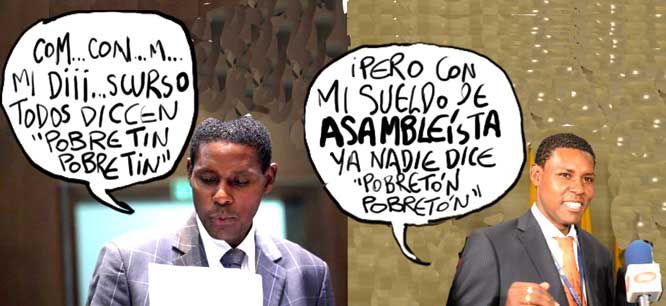
Ecuadorean cartoonist Xavier Bonilla, known as Bonil and an arts nominee in the 2015 Index on Censorship Freedom of Expression awards, faces a hearing today at 9am (2pm GMT) under the country’s controversial communications law, which was introduced in 2013.
Bonilla and his newspaper, El Universo, will appear in front of Ecuador’s Superintendence of Information and Communication in response to the photographic montage pictured above. He was originally accused of racism – publicly by President Rafael Correa on his weekly TV broadcast – and then the charge was changed to “economic discrimination”.
The newspaper could face a $180K penalty since Ecuador’s communications law specifies a doubling of fines for each incident. Previously, El Universo was fined $93K for a cartoon that mocked a police raid.
The work mocks assemblyman and ex-footballer Agustín Delgado, nicknamed Tín, as he fumbles during a speech. It features a play on words – Pobre Tín, meaning Poor Tin, and Pobretón, meaning poor guy (with no money). The joke implies that people may feel sorry for Delgado for stuttering during his speech but no one feels sorry for his hefty government salary.
Bonilla’s critics say that because Delgado comes from a poor background and has no college degree, he should not be mocked.
“Freedom of expression here is permanently at risk”, Bonilla told Index during a recent interview. “Cartoons represent a satirical and humorous take on all things that happen in public life. It’s part of debate in societies that are democratic, modern and civilized. The public identify with a cartoons through their humour, and often humour represents a chance for a sort of revenge. When there is an excessive power, the normal citizen can see in a cartoon, in comedy, or in a TV sketch, that they have been defended. Because the power has been ‘censored’, morally censored, because a cartoon is an imaginary triumph against the powerful, the abusive, the arrogant, the corrupt.”
Read more on Ecuador’s media controls:
Ecuador’s crackdown on Twitter critics
Cartoonist sanctioned after under Ecuador’s communications law
Ecuador’s president wages social media counterattack aimed at ‘defamers’
This article was posted on 9 Feb 2015 at indexoncensorship.org




